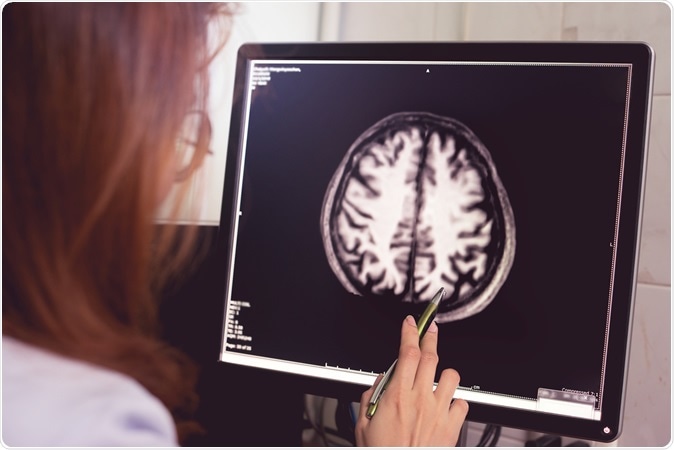Researchers have shown that early dementia signs could be detected by a simple short scan of the individual’s neck. The actual dementia symptoms could be seen up to 10 years after these signs are visible on the scans they add. If proven robust for all cases, this test could soon become routine for screening middle aged individuals and classifying them as high risk for dementia later in life.
The researchers at the University College London (UCL) looked at the strength of a pulse travelling to the brain via the neck from the heart. The intensity of this pulse from the heart to different parts of the body often varies. The large blood vessels are normally elastic and they absorb the major pulse intensity from the heart due to their wall elasticity. This leads to diminishing the pulse intensity that travels to the brain and thus it prevents damage to the delicate and thin blood vessels of the brain, the team explains.

MRI brain of Dementia patient with left parietal atrophy asymmetry. Shutterstock / Atthapon Raksthaput
As a person ages, the wall elasticity of the arteries is lost and they become rigid. This means that the full intensity of the heart beat pulse reaches the brain via the stiffened arteries. This can damage the smaller and more delicate brain blood vessels which could eventually cause damage to the brain and its tissues leading to dementia. There are mini-strokes as these delicate blood vessels are damaged and they form new networks and undergo structural changes. These changes are all contributory to dementias, the authors explain.
For this study the team looked at around 3,200 middle-aged participants who were followed for an average of 15 years to see if they were at high risk of dementia. They underwent an ultrasound test of the neck in 2002 to see if their pulse intensity to the brain. In addition memory functions and problem solving tests were also conducted on these participants at baseline. Results showed that those who had the highest pulse intensity were 50 percent more likely to show an accelerated or rapidly progressing decline in cognitive abilities over the following 10 years compared to those who had a lower intensity. The team adjusted their results for other factors that may influence dementia risks such as age, blood pressure, obesity, presence of diabetes and other heart diseases.
According to the researchers, the neck scan could predict the “risk scores” for dementia later in life and increased pulse intensity was associated with a significant decline in memory, thinking, problem solving, language etc.
Dr Scott Chiesa, post-doctoral researcher at UCL in a statement said, “These findings demonstrate the first direct link between the intensity of the pulse transmitted towards the brain with every heartbeat and future impairments in cognitive function. It's therefore an easily measurable and potentially treatable cause of cognitive decline in middle-aged adults which can be spotted well in advance.”
The study was co-funded by the British Heart Foundation. Professor Metin Avkiran, the associate medical director of the BHF said that this could soon become a tool to detect dementia way before symptoms appeared. He added, “What we need now is further research, for example to understand whether lifestyle changes and medicines that reduce pulse wave intensity also delay cognitive decline.” As of now keeping blood pressure and cholesterol levels in check with appropriate medication when prescribed, in addition to a healthy diet and regular exercise can help keep dementia at bay say the experts.
The team is presenting the results of this study at the American Heart Association Scientific Sessions conference in Chicago.